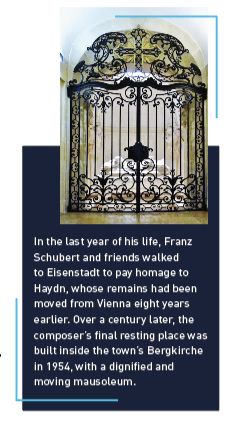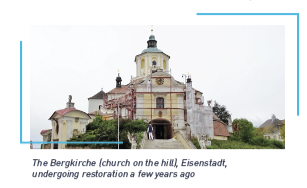 Composed 1828; 54 minutes
Composed 1828; 54 minutes
Schubert wrote his great C major String Quintet in September and, perhaps, early October, 1828, at the age of 31, during a period of declining health. But nothing in the music—and little in his activities that year—suggests that he was preparing for death. That summer, he continued to attend cultural salons and frequent his favorite Viennese taverns and coffee-houses. In early October, he made a three-day, 60-mile walking trip with friends to Eisenstadt to visit the grave of Haydn. Back in Vienna, he began advanced lessons in counterpoint with a renowned Viennese theorist. Three publishers contacted him that year requesting new works. Far from retreating, Schubert was fully engaged with life.
Though nominally in C major, the Quintet opens with tonal ambiguity, as the opening chord wavers between major and minor, immediately creating a feeling of spaciousness and anticipation. The second theme is equally striking. It appears in the unusual key of E-flat and is played by both cellos. Where Mozart and Beethoven had used two violas in their quintets, Schubert opted for two cellos, seeking a romantic color palette that is rich, resonant, and expansive. The lower instrument’s wide tenor range allowed him to explore sonorities unmatched in an earlier quintet he composed at age 14, titled Overture in C minor, D. 8, with two-viola scoring.
The slow movement is ethereal, built around an organ-like melody in the inner voices, with a shimmering violin melody above and a sonorous cello pizzicato below. An anguished middle section forms a dramatic contrast.The Scherzo begins with rustic high spirits, typical of Schubert, but the trio is anything but conventional, plunging the music into distant keys at a considerably slower speed and in a different tempo. No other composer had done this—except Schubert himself in works from the same period. The finale is optimistic and forward moving, blending a sprightly Hungarian dance rhythm with the cozy Gemütlichkeit of a more sentimental Viennese café melody.
 Schubert’s C major Quintet has long been revered by musicians. Its combination of bold, muscular counterpoint, rhythmic drive, and luminous, contemplative lyricism is unmistakably Schubert—and strikingly prophetic of Viennese music to come. The work influenced Brahms, Bruckner, Berg, and many others. Pianist Artur Rubinstein requested the slow movement for his funeral. To this day, it speaks to listeners with a voice that is both deeply intimate and universal.
Schubert’s C major Quintet has long been revered by musicians. Its combination of bold, muscular counterpoint, rhythmic drive, and luminous, contemplative lyricism is unmistakably Schubert—and strikingly prophetic of Viennese music to come. The work influenced Brahms, Bruckner, Berg, and many others. Pianist Artur Rubinstein requested the slow movement for his funeral. To this day, it speaks to listeners with a voice that is both deeply intimate and universal.
— All program notes copyright © 2025 Keith Horner.
Comments welcomed: khnotes@sympatico.ca